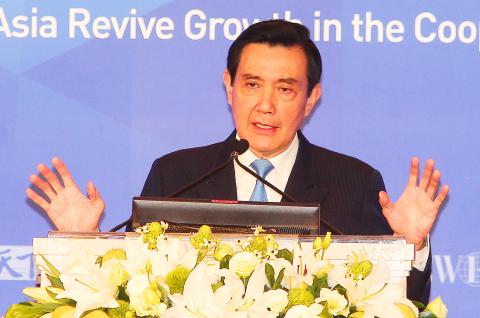President Ma Ying-jeou (馬英九) yesterday said that the word “caretaker” was not in his dictionary, brushing aside calls to leave important decisions to a new administration, while promising to forge ahead on several regional trade agreements.
Following the elections on Saturday last week, which saw the Democratic Progressive Party (DPP) win the presidency and legislature in a landslide, DPP officials have called for Ma’s administration to serve as a caretaker government, deferring important decisions to president-elect Tsai Ing-wen (蔡英文).
However, at an economic forum on Asian economic growth at the Grand Hyatt Taipei, Ma said that reviving economic growth and dealing with the slump in exports that followed the European debt crisis were global problems, while finding a new competitive edge for the economy was the inescapable responsibility of any Taiwanese leader.

Photo: CNA
At a time when the functionality of the WTO is declining and other nations are continually signing bilateral trade deals, Taiwan must follow the trend of the global economy, he said.
Economic integration is a new thing for Asia, he said, citing the conclusion of Trans-Pacific Partnership and Regional Comprehensive Economic Partnership negotiations, along with the establishment of the ASEAN Economic Community last month.
While Taiwan wants to participate in each of these agreements, accession is difficult not only economically, but also for many political reasons, he said, promising to continue pushing for the nation to be included over the remainder of his term.
“It is I ‘still’ have four months, not I ‘only’ have four months,” he said, referring to his term’s expiration on May 20.
“My dictionary does not have the words ‘caretaker’ or ‘slacker,’ in it,” he added.
Ma said that a peaceful political environment was a necessary condition of market stability, adding that no one should “rule out” deals with China because such a policy would be not only mistaken, but also potentially fatal for Taiwan.
The president said a peaceful environment was also a precondition for economic growth, adding that the so-called “1992 consensus” had served to make both sides of the Taiwan Strait peaceful and prosperous over the past eight years, a period that saw Taiwan achieve the warmest possible relations with both the US and China.
Cross-strait peace was hard-won and people should learn to treasure and work hard to preserve it, he said, in an apparent jab at Tsai.
The “1992 consensus” refers to a supposed tacit understanding between Chinese Nationalist Party (KMT) and the Chinese Communist Party that there is “one China,” but both sides have different interpretations of what “China” means.
Additional reporting by Abraham Gerber

CHAOS: Iranians took to the streets playing celebratory music after reports of Khamenei’s death on Saturday, while mourners also gathered in Tehran yesterday Iranian Supreme Leader Ayatollah Ali Khamenei was killed in a major attack on Iran launched by Israel and the US, throwing the future of the Islamic republic into doubt and raising the risk of regional instability. Iranian state television and the state-run IRNA news agency announced the 86-year-old’s death early yesterday. US President Donald Trump said it gave Iranians their “greatest chance” to “take back” their country. The announcements came after a joint US and Israeli aerial bombardment that targeted Iranian military and governmental sites. Trump said the “heavy and pinpoint bombing” would continue through the week or as long

TRUST: The KMT said it respected the US’ timing and considerations, and hoped it would continue to honor its commitments to helping Taiwan bolster its defenses and deterrence US President Donald Trump is delaying a multibillion-dollar arms sale to Taiwan to ensure his visit to Beijing is successful, a New York Times report said. The weapons sales package has stalled in the US Department of State, the report said, citing US officials it did not identify. The White House has told agencies not to push forward ahead of Trump’s meeting with Chinese President Xi Jinping (習近平), it said. The two last month held a phone call to discuss trade and geopolitical flashpoints ahead of the summit. Xi raised the Taiwan issue and urged the US to handle arms sales to

State-run CPC Corp, Taiwan (CPC, 台灣中油) yesterday said that it had confirmed on Saturday night with its liquefied natural gas (LNG) and crude oil suppliers that shipments are proceeding as scheduled and that domestic supplies remain unaffected. The CPC yesterday announced the gasoline and diesel prices will rise by NT$0.2 and NT$0.4 per liter, respectively, starting Monday, citing Middle East tensions and blizzards in the eastern United States. CPC also iterated it has been reducing the proportion of crude oil imports from the Middle East and diversifying its supply sources in the past few years in response to geopolitical risks, expanding

Pro-democracy media tycoon Jimmy Lai’s (黎智英) fraud conviction and prison sentence were yesterday overturned by a Hong Kong court, in a surprise legal decision that comes soon after Lai was jailed for 20 years on a separate national security charge. Judges Jeremy Poon (潘兆初), Anthea Pang (彭寶琴) and Derek Pang (彭偉昌) said in the judgement that they allowed the appeal from Lai, and another defendant in the case, to proceed, as a lower court judge had “erred.” “The Court of Appeal gave them leave to appeal against their conviction, allowed their appeals, quashed the convictions and set aside the sentences,” the judges